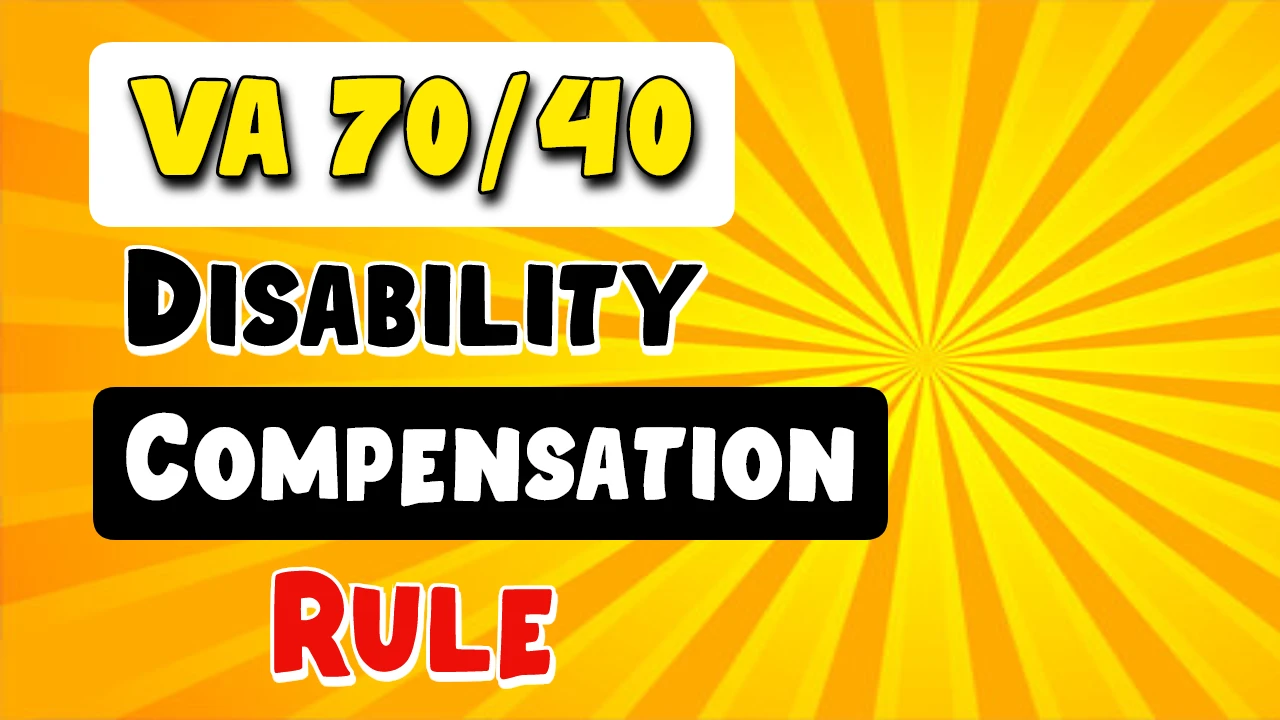Veterans who are rated for V.A. disability compensation may have heard of the 70/40 disability rule. Veterans with more than one service-connected disability are also subject to this iteration, which controls what they will be paid each month. Veterans must understand how this rule works if they want to understand how their combined disability ratings impact their benefits.
The VA 70/40 rule can seem complex initially, but it is simply a means by which the VA acknowledges both physical and psychological health issues that coincide with one another. If a veteran has a 70 and 40, there could be special benefits available for them, outside of the 100 percent rating.
VA 70/40 Disability Compensation Rule
The VA doesn’t just add 70%, 80%, and 10% together to come up with the final number. Instead, they refer to a unique formula known as the VA combined ratings table. This means that two different 70% and 40% rated conditions will not simply add up to 110%. Instead, there is a lesser combined value, with the second rating used on only so much of the veteran’s remaining capacity to act. This also makes sure the ratings never go beyond the 100%.
If a vet has one condition with a 70% rating, the VA looks at that person as being 30% effective. If they have another 40% condition, then that 40% is on the remaining 30% of the body. That adds 12% to it, which is layered on top of the 70%, to total 82%. The VA then will round this figure to the nearest 10%, leaving the veteran with an 80% combined rating. This demonstrates how the process is not simply adding.
VA 70/40 Disability Compensation Rule Explained: Overview
| Article On | VA 70/40 Disability Compensation Rule Explained |
| Country | USA |
| Department | Department of Veterans Affairs (VA) |
| Eligibility | Must have service-connected disability |
| Amount | As per eligibility |
| Payment Mode | Direct Deposits and Paper Checks |
| Payment Schedule | Monthly |
| Category | Government Aid |
| Official Website | https://www.va.gov/ |
Eligibility for VA 70/40 Disability Compensation
- Veterans will be required to possess a service-connected disability of at least 40%.
- Have a second service-connected disability that is independently rated at 60% or more.
- Disabilities need to be recognized and approved disability by the VA.
- Conditions must be incurred or aggravated during military service.
- The person cannot be gainfully employed full-time or working at an income above VA.
- Should file the appropriate forms and medical proof with the VA for TDIU evaluation.
- The claim must be decided and authorized by the VA regional office or Board of Veterans’ Appeals.
Purpose of the 70/40 Rule
One rule that is discussed often when one is discussing eligibility for a benefit referred to as TDIU is called the 70/40 rule. TDIU is awarded to veterans who, for any reason, cannot work because of their service-connected disabilities, even though their total disability rating is less than 100%. A veteran must have one condition rated at 60% or one condition at 40% with a combined total of 70% or more to qualify.
The rule assists the VA in identifying veterans who are profoundly affected by their conditions and require a maximum level of financial support. Even with an 80% rating, all of these veterans can qualify for benefits rated 100%, according to employment and medical evidence. It’s significant because many veterans have difficulty securing and holding jobs because of physical or mental disabilities.
Benefits of 70/40 Rule Compliance
Meeting the 70/40 rule does not automatically mean you will have a 100% rating, but it will open the door for your veteran’s financial compensation for their disabilities to be increased. Veterans determined eligible under this provision are unable to work by the VA and are paid at the 100 percent rate.
A great number of veterans, who are not otherwise eligible, are afforded TDIU benefits that allow them to care for their families. Other benefits include access to other programs, including VA health care, dental care, education benefits for dependents, and assistance to help with housing and home improvements.
Common Mistakes
Some veterans are confused by the 70/40 rule and mistakenly believe that the figures guarantee them a higher amount of money. The VA still considers whether the person can work and whether the person’s conditions are documented. To qualify, veterans need to submit medical documentation and employment records that prove they are unable to work because of service-connected conditions.
Another common challenge is an ignorance that mental health conditions can qualify. A service member might be rated at 40 percent for a physical injury and at 70 percent for a mental health condition. This pair falls within the 70/40 rule still. It’s also crucial to meet deadlines and to reply to any VA requests for supplemental documents to ensure that your benefits don’t face delays or get denied.
FAQs
Can I still get TDIU rated with 70% and a 40% disability rating?
Yes, you may be eligible, if you have service-connected disabilities and cannot work. You will need to apply to the VA with the evidence they require.
Can psychiatric illnesses be included in the 70/40 rule?
Yes, mental health conditions that are service-connected, such as PTSD, Anxiety, and Depression, can be included as part of the ratings combination.
Can I only be unemployed for the required 5 years under the 70/40 rule to file TDIU?
You have to be unable to engage in significant gainful activity. You may be allowed to work part-time or temporarily, but full-time work typically disqualifies you.



